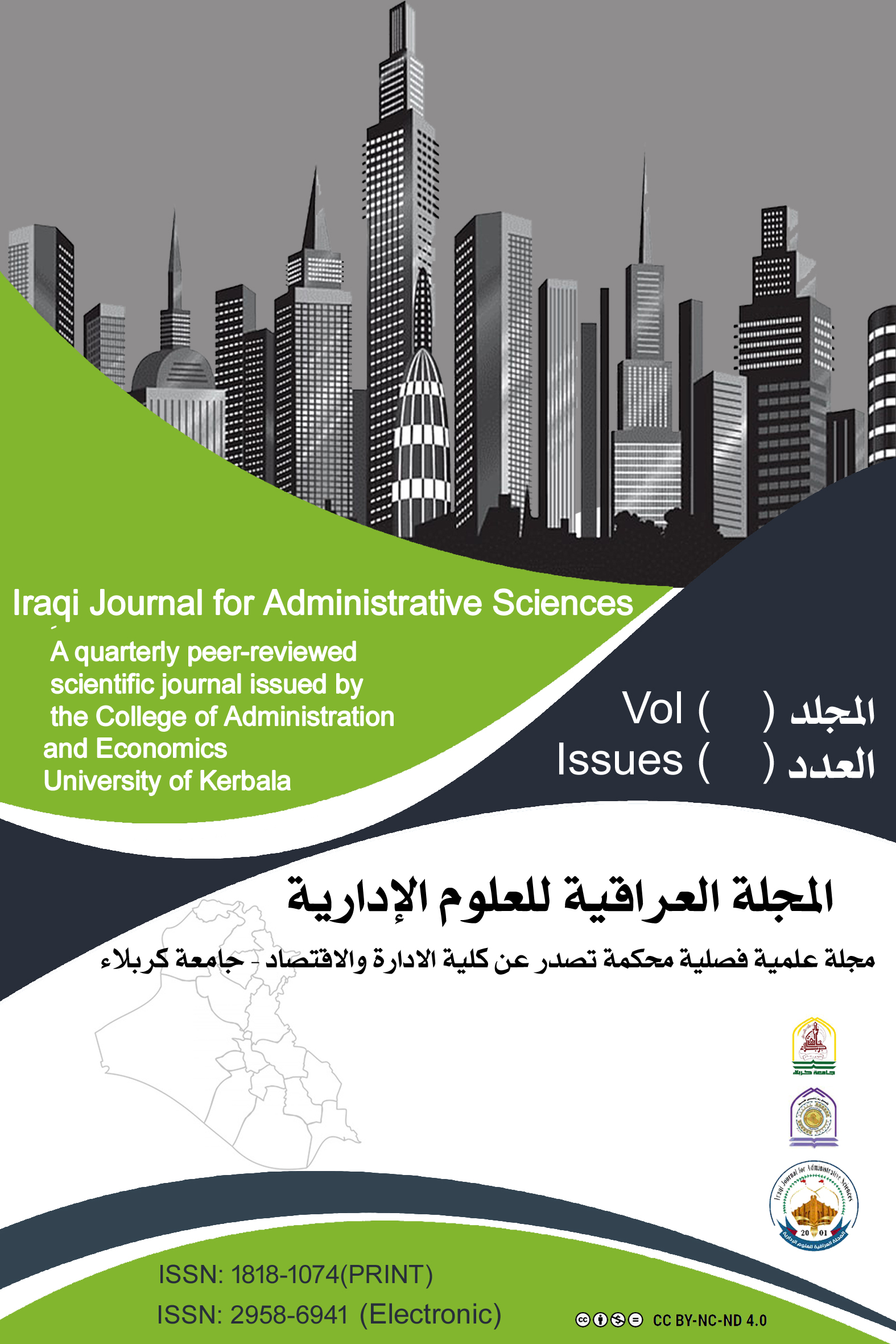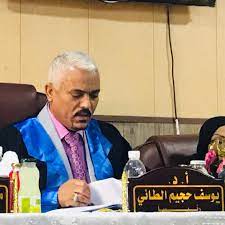
Journal Information
Iraqi Journal for Administrative Sciences
Volumes and Issues
2025
Volume 21, Issue 86
Published: December 2025Volume 21, Issue 85
Published: September 2025Volume 21, Issue 84
Published: June 2025Volume 21, Issue 83
Published: March 20252024
Volume 20, Issue 82
Published: December 2024Volume 20, Issue 81
Published: September 2024Volume 20, Issue 80
Published: June 2024Volume 20, Issue 79
Published: March 20242023
Volume 19, Issue 78
Published: December 2023Volume 19, Issue 77
Published: September 2023Volume 19, Issue 76
Published: June 2023Volume 19, Issue 75
Published: March 20232022
Volume 18, Issue 74
Published: December 2022Volume 18, Issue 73
Published: September 2022Volume 18, Issue 72
Published: June 2022Volume 18, Issue 71
Published: March 20222021
Volume 17, Issue 70
Published: December 2021Volume 17, Issue 69
Published: September 2021Volume 17, Issue 68
Published: June 2021Volume 17, Issue 67
Published: March 20212020
Volume 16, Issue 66
Published: December 2020Volume 16, Issue 65
Published: September 2020Volume 16, Issue 64
Published: June 2020Volume 16, Issue 63
Published: March 20202019
Volume 15, Issue 62
Published: December 2019Volume 15, Issue 61
Published: September 2019Volume 15, Issue 60
Published: June 2019Volume 15, Issue 59
Published: March 20192018
Volume 14, Issue 58
Published: December 2018Volume 14, Issue 57
Published: September 2018Volume 14, Issue 56
Published: June 2018Volume 14, Issue 55
Published: March 20182017
Volume 13, Issue 54
Published: December 2017Volume 13, Issue 53
Published: September 2017Volume 13, Issue 52
Published: June 2017Volume 13, Issue 51
Published: March 20172016
Volume 12, Issue 50
Published: December 2016Volume 12, Issue 49
Published: September 2016Volume 12, Issue 48
Published: June 2016Volume 12, Issue 47
Published: March 20162015
Volume 11, Issue 46
Published: December 2015Volume 11, Issue 45
Published: September 2015Volume 11, Issue 44
Published: June 2015Volume 11, Issue 43
Published: March 20152014
Volume 10, Issue 42
Published: December 2014Volume 10, Issue 41
Published: September 2014Volume 10, Issue 40
Published: June 2014Volume 10, Issue 39
Published: March 20142013
Volume 9, Issue 38
Published: December 2013Volume 9, Issue 37
Published: September 2013Volume 9, Issue 36
Published: June 2013Volume 9, Issue 35
Published: March 20132012
Volume 8, Issue 34
Published: December 2012Volume 8, Issue 33
Published: September 2012Volume 8, Issue 32
Published: June 2012Volume 8, Issue 31
Published: March 20122011
Volume 7, Issue 30
Published: September 2011Volume 7, Issue 29
Published: September 2011Volume 7, Issue 28
Published: June 20112010
2009
Volume 6, Issue 25
Published: September 2009Volume 6, Issue 24
Published: June 2009Volume 6, Issue 23
Published: March 20092008
Volume 6, Issue 22
Published: December 2008Volume 5, Issue 21
Published: September 2008Volume 5, Issue 20
Published: June 2008Volume 5, Issue 19
Published: March 20082007
Volume 5, Issue 18
Published: December 2007Volume 4, Issue 17
Published: September 2007Volume 4, Issue 16
Published: June 2007Volume 4, Issue 15
Published: March 20072006
Volume 4, Issue 14
Published: December 2006Volume 4, Issue 13
Published: September 2006Volume 3, Issue 12
Published: June 2006Volume 3, Issue 11
Published: March 20062005
2004
2002
2001
About the Journal
Description
The Iraqi Journal for Administrative Sciences is listed among the journals approved for scientific promotion, according to the official book issued by the Iraqi Ministry of Higher Education and Scientific Research/Department of Research and Development, according to the official book No. BT/71 on 11/1/2005.
Deposit number in the Iraq National Library and Archives: Baghdad 725 of 2001 AD
The Iraqi Journal for Administrative Sciences, with the International Standard Serial Numbers (ISSN P.1818-1074; ISSN E.2958-6941), is a peer-reviewed international scientific journal published quarterly by the College of Administration and Economics at the University of Karbala/Iraq. It focuses on administrative, accounting, statistical, and economic studies. The journal aims to stimulate scientific research and be included in reputable international databases. It provides researchers with a significant opportunity to evaluate their work scientifically through stringent peer-review processes. The journal encourages scholarly communication, presenting research to achieve scientific dialogue and utilizing research results in the service of scientific inquiry.
The official website of the Iraqi Journal of Administrative Sciences:
http://journals.uokerbala.edu.iq/index.php/ijas/index
Peer Review Process
The Iraqi Journal of Administrative Sciences publishes original research that has not been published before.
Our criteria for publication are that the article must make a theoretical or practical contribution to the relevant field and provide practical guidelines for key interest groups such as government, policymakers, practitioners, academics, students, etc.
General criteria are also used, such as novelty of the topic, academic suitability, accuracy of methodology, grammar, focus on the study\'s problem, and providing the best solutions to address the problems. These criteria are used to judge an article\'s suitability for publication.
Two or three evaluators follow the scientific review and evaluation process after concealing the researcher\'s name and place of work. Once the research is received, it is sent to both the president and the managing editor to decide the suitability of the study and the extent to which it conforms to the terms of the journal, and the percentage of introspection should be low, less than 20%. After that, it is sent to the appropriate reviewers, who review the article and evaluate its suitability for publication in our journal. The scientific evaluator fills out a particular form about the article, which is then sent to the editorial director. The editorial board then makes the final decision, with the researcher’s commitment to implementing all amendments requested by the scientific evaluators. Submitting arguments if the evaluators’ response does not convince you and the journal\'s president, managing editor, and scientific reviewer review them.
Open Access Policy
This journal provides immediate access to its content on the principle that making research freely available to the public supports a greater global knowledge exchange.
Plagiarism Policy
We use Turnitin software (www.turnitin.com) to check the similarity in the work submitted. Similarity up to less than 20% is allowed in any submitted work. The author is responsible for ensuring that the work submitted belongs to the author and is not copied from any other source. Furthermore, the author must ensure that the similarity level does not exceed the mentioned limit.
Ethics Policy
We follow ethical standards generally accepted by the scientific community. We strive to prevent any violations of the rules. The Statement of Publication Ethics is based on the guidelines and standards set by the Committee on Publication Ethics (COPE) and includes the relevant responsibilities of editors, reviewers, and authors. For more information, all terms of publication ethics can be found on the COPE website as follows https://publicationethics.org/core-practices
Researcher\'s responsibility:
- Adherence to ethical standards and principles is needed in preparing and publishing the article.
- A manuscript containing correct information must be submitted and attributed to solid references. A list of references must be provided at the end of the article through which the article used in the manuscript can be accessed, and the articles used must be within the scope of the manuscript.
- Commitment to writing the manuscript according to the Iraqi Journal for Administrative Sciences model.
- Adherence to correct citation rules and correct documentation.
- Do not submit an article previously published in other journals, even if it was published in another language.
- Do not submit the same manuscript to more than one journal simultaneously. This is contrary to the ethics of international publishing.
- After receiving the journal\'s official rejection, the researcher can publish his research in other journals or submit an official request to the editor-in-chief to withdraw the manuscript submitted to the journal and obtain approval to withdraw the manuscript.
- Obtaining the approval of all co-authors who contributed significantly to the preparation of the manuscript before submitting it for publication in the Iraqi Journal for Administrative Sciences. (The responding author who will communicate directly with the journal must be determined, and this must be recorded inside the manuscript, along with his email and full address to speak with him).
- The authors\' names participating in the research must be mentioned correctly and in the correct sequence. After submitting the research to the journal, it is not permitted to change any name, add another name, or change the sequence of researchers. These authors must have contributed to the completion of the research.
- At the end of the manuscript, you can thank the people or organizations that helped you complete the manuscript by providing information or agreeing to be a sample for your study.
- Disclosure to the magazine in the event of a conflict of interest.
- The research meets ethical standards and considers the rights of humans and animals if they are included as a sample in its study.
- Stay away from plagiarism and forgery.
- If the researcher discovers an error in his research, he must alert the journal before publishing the manuscript.
- The researcher must adhere to the referees’ suggestions and amendments. If he does not wish to make some amendments, he must provide a clear justification for that. After reviewing the justifications, the journal makes the final decision and may approve or reject them if they are not convincing.
- The researcher must not tamper with or add citations (quotations) from previous research he owns to the research he wants to publish. If he wants to add a citation from research that he owns, it must not exceed 3 of the sources included in the study that he wants to publish in our journal, and these sources must be related to the topic of the current research that he wants to publish in our journal.
Responsibility of the scientific reviewer of the manuscript:
- Inform the editorial director if you are unable to review the manuscript.
- Adherence to ethical standards in the arbitration process.
- Please do not use the information in the manuscript evaluated for personal interest or send the manuscript or part of it to a third party.
- The arbitrator does not accept to evaluate the step involving a conflict of interest due to a competitive relationship with the author.
- Ensure that the manuscript under evaluation is free of plagiarism, and inform the editor-in-chief of any similarity with the manuscript under assessment and other articles published in the same or another language if he has access to them.
- Commitment to confidentiality in evaluating the manuscript and not to disclose it or discuss its topics with others except for the chief and editor-in-chief.
- Adopting the principle of integrity in the manuscript evaluation process.
- Objectivity in the manuscript evaluation process.
- Commitment to the period for evaluating the manuscript.
- At the end of the research, you can thank the people or organizations that helped you complete the research by providing information or agreeing to be a sample for your study. You must include the number and date of the official letter issued by the organization that decided to conduct your study. The number and date of the official letter should be included in the research sample, and the journal should be provided with a copy of the letter of approval.
- Handle authors’ complaints and retain any documents related to the complaints.
Responsibility of the managing editor:
- In cooperation with the editorial board, the editor-in-chief or managing editor of the magazine is responsible for selecting reviewers whose specialties are appropriate for the manuscript sent to them for evaluation.
- The decision to publish or not to publish depends on the referees’ reports, their scientific observations, the extent of their originality, and their relevance to the journal’s specialty.
- Ensure that the confidentiality of the arbitration process and information received from the arbitrators is maintained.
- Ensure that research is reviewed confidentially.
Open Access Statement
this journal, operated by \"The College of Administration and Economics/University of Kerbala,\" is an open-access journal, which means that all contents are freely available without charge to the user or his/her institution. The journals follow the Creative Common Attribution Noncommercial 4.0 Licence (CC BY), which means we allow our readers to read, download, copy, distribute, print, search, or link to the full texts of the articles or use them for any other lawful purpose, without asking prior permission from the publisher or the author. The BOAI also defines this as open access.
Journal Scope
All areas of business administration (management, economics, accounting, financial and banking sciences, statistics, Production and operations management)
Open Access Policy
Open Access Policy
This journal provides immediate access to its content on the principle that making research freely available to the public supports a greater global knowledge exchange.
Plagiarism Policy
We use Turnitin software (www.turnitin.com) to check the similarity in the work submitted. Similarity up to less than 20% is allowed in any submitted work. The author is responsible for ensuring that the work submitted belongs to the author and is not copied from any other source. Furthermore, the author must ensure that the similarity level does not exceed the mentioned limit.
Copyright Notice
Editorial Board Members
Editor
Ahlam Ibrahim Wali Ali Dr. (دكتوراه) , Professor (استاذ)
College of Administration and Economics /Salahaddin University-Erbil. Kurdistan region. IRAQ
Amer Omran Almamury Dr. (دكتوراه) , Professor (استاذ)
College of Administration and Economics /Kerbala University. IRAQ.
Bilal Khalaf Subh Al-Sakarneh Dr. (دكتوراه) , Professor (استاذ)
Isra University. Jordan
Craig N. Refugio Dr. (دكتوراه) , Professor (استاذ)
Negros Oriental State University. Philippines, Dumaguete City
Faisal Nayef Al-Madi Dr. (دكتوراه) , Professor (استاذ)
The Hashemite University/ Faculty of Business Administration. Jordan
Ghousia Khatoon Dr. (دكتوراه) , Professor (استاذ)
Tishk International University Faculty of Administrative Sciences and Economics Department of Accounting, Banking and Finance. Erbil
Mahmod Fahad Abid Ali Dr. (دكتوراه) , Professor (استاذ)
College of Administration and Economics /Karbala University. IRAQ
Mahmoud Ibrahim Mahmoud Nour Dr. (دكتوراه) , Professor (استاذ)
ISRAA University - college of managerial and financial sciences. Jordan

Maitham Rabie Hadi Al-Hasnawi Dr. (دكتوراه) , Professor (استاذ)
College of Administration and Economics /Karbala University. IRAQ
Munshi Muhammad Abdul Kader Jilani Dr. (دكتوراه) , Assistant Professor (استاذ مساعد)
Assistant Professor, Department of Human Resource Management, Bangladesh Institute of Governance and Management (BIGM), University of Dhaka (Affiliated), Dhaka, Bangladesh.

Saad Ali Hamoud Al- Aienizi Dr. (دكتوراه) , Professor (استاذ)
College of Administration and Economics /Ashur University.
Salah Mahdi Jawad Al-Kawaz Dr. (دكتوراه) , Professor (استاذ)
College of Administration and Economics /Karbala University. IRAQ
Shorouq Abid AlRidha AlSabbah Dr. (دكتوراه) , Professor (استاذ)
College of Administration and Economics /Kerbala University. IRAQ.

Taqi Abudal Riza Al-Abedwani Dr. (دكتوراه) , Professor (استاذ)
Gulf College. Sultanate of Oman

Youssef Hachaym Sultan Al-Taie Dr. (دكتوراه) , Professor (استاذ)
College of Administration and Economics /University of Kufa
Editor-in-Chief

Ali Abdulhassan Abbas Dr. (دكتوراه) , Professor (استاذ)
College of Administration and Economics /Kerbala University. IRAQ.
Managing Editor

Ahmed Abid Allah Amana Dr. (دكتوراه) , Professor (استاذ)
College of Administration and Economics /Kerbala University. IRAQ.
Contact Info
وزارة التعليم العالي والبحث العلمي العراقية
جامعة كربلاء/ كلية الادارة والاقتصاد
العنوان: العراق- محافظة كربلاء المقدسة- جامعة كربلاء- المدينة الجامعية- منطقة فريحة
كلية الادارة والاقتصاد - مبنى العمادة- الطابق الاول
الموقع الالكتروني الرسمي الخاص بالمجلة العراقية للعلوم الادارية:
http://journals.uokerbala.edu.iq/index.php/ijas/index
ترسل البحوث الى الايميل الخاص بالمجلة: imfms@uokerbala.edu.iq
الاتصال بالمجلة: في حالة وجود استفسار حول طريقة النشر او اي معلومات اخرى يمكنكم الاتصال بالاتي:
الايميل الخاص برئيس التحرير: ali.abd.alhassan@uokerbala.edu.iq , fuhrer313@gmail.com
رئيس هيئة التحرير: أ.د علي عبد الحسن عباس حسن الفتلاوي
رقم الموبايل: 009647801127885 متوفر واتساب، تيلكرام، فايبر
Ministry of Higher Education & Scientific Research of Iraq
university of kerbala/ College of Administration and Economics
Address: Iraq - Holy Karbala Governorate - Karbala University - University City - Fariha area
College of Administration and Economics - Deanship Building - First Floor
The official website of the Iraqi Journal for Administrative Sciences:
http://journals.uokerbala.edu.iq/index.php/ijas/index
Send the manuscript to the journal’s email: imfms@uokerbala.edu.iq
Contacting the journal: If you have any questions about the method of publication or any other information, you can contact the following:
Email of the Editor-in-Chief: ali.abd.alhassan@uokerbala.edu.iq, fuhrer313@gmail.com
Head of the editorial board: Prof. Dr. Ali Abdulhassan Abbas Hassan Al-Fatlawi
Mobile number: 009647801127885 (Available on WhatsApp, Telegram, Viber)
--------------------------------------------------------------------------------------------------------------------
مدير التحرير: أ.د احمد عبد الله امانة
ahmed.a@uokerbala.edu.iq
موبايل: 009647706038888
Editorial Manager:
Prof. Dr. Ahmed Abid Allah Amana
Email: ahmed.a@uokerbala.edu.iq
Mobile: 009647706038888